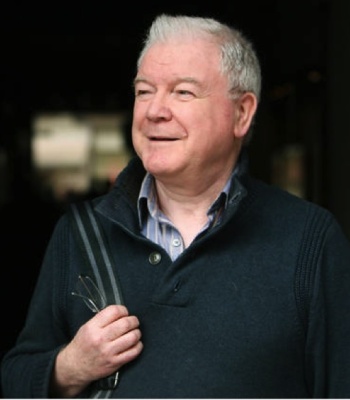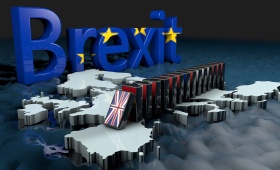 We gladly announce that prof. Dennis Smith, Emeritus Professor of Sociology at Loughborough University, UK, is going to deliver lectures concerning Brexit issue at the Department of Hisotrical Sociology, FHS UK. In these presentations Dennis Smith asks why Brexit was set in motion, what it tells us about the dynamics of European society and politics, including Britain, and what may lie before us as Europeans
We gladly announce that prof. Dennis Smith, Emeritus Professor of Sociology at Loughborough University, UK, is going to deliver lectures concerning Brexit issue at the Department of Hisotrical Sociology, FHS UK. In these presentations Dennis Smith asks why Brexit was set in motion, what it tells us about the dynamics of European society and politics, including Britain, and what may lie before us as Europeans
Dennis Smith was initiated as a historian at Christ’s College, Cambridge, and as a sociologist at LSE and Leicester University. His books include Civilized Rebels. An Inside Story of the West’s Retreat from Global Power (Routledge),The Rise of Historical Sociology (Polity), Zygmunt Bauman (Polity), Globalization. The Hidden Agenda (Polity), Capitalist Democracy on Trial (Routledge),Norbert Elias and Modern Social Theory (Sage), Barrington Moore. Violence, Morality and Political Change (Macmillan), Conflict and Compromise. Class Formation in English Society 1830-1914 (Routledge), and (with Sue Wright) Whose Europe. The Turn Towards Democracy (Blackwell). He has been Vice-President of the European Sociological Association and Managing Editor of Sociological Reviewand Current Sociology (ISA journal).
Time & Place: Monday, Oct. 21, 14:00-15:20, Jinonice 2071
 Soon after the disastrous Suez campaign (1956) Britain restored its national pride by rebuilding its infrastructure, then hitched itself to the newly-founded European Economic Community. Immigration from the so-called New Commonwealth (eg Jamaica, Barbados, India), helped to rebuild Britain. Ironically, the presence of these immigrants triggered old imperialist racist responses in many white communities, which fed back into the continuing debate over UK membership of the Common Market, poisoning the debate over Brexit.
Soon after the disastrous Suez campaign (1956) Britain restored its national pride by rebuilding its infrastructure, then hitched itself to the newly-founded European Economic Community. Immigration from the so-called New Commonwealth (eg Jamaica, Barbados, India), helped to rebuild Britain. Ironically, the presence of these immigrants triggered old imperialist racist responses in many white communities, which fed back into the continuing debate over UK membership of the Common Market, poisoning the debate over Brexit.
Time & Place: Tuesday, Oct. 22, 14:00-15:20, Jinonice 6022
 In the 2014 European parliamentary elections, the United Kingdom Independence Party led by Nigel Farage was top of the poll in Britain. This led to five years of intense efforts by Conservative UK governments to outbid Mr Farage’s cultivation of anti-EU sentiments. For UK’s leading politicians Brexit was a largely unintended and unexpected consequence. Ironically, in spite of all their efforts, by 2019 Farage was once again top of the UK poll in the European parliamentary elections, this time as leader of the Brexit party. In the meantime an accidental constitutional earthquake had occurred in the UK.
In the 2014 European parliamentary elections, the United Kingdom Independence Party led by Nigel Farage was top of the poll in Britain. This led to five years of intense efforts by Conservative UK governments to outbid Mr Farage’s cultivation of anti-EU sentiments. For UK’s leading politicians Brexit was a largely unintended and unexpected consequence. Ironically, in spite of all their efforts, by 2019 Farage was once again top of the UK poll in the European parliamentary elections, this time as leader of the Brexit party. In the meantime an accidental constitutional earthquake had occurred in the UK.
Time & Place: Wednesday, Oct. 23, 12:30-13:50, Jinonice 2071
 World War One accelerated the disintegration of dynastic imperialism that had already been signalled by Spain’s military defeat in 1898. After 1945 Cold War structures imposed an iron immobility for four decades but they, too, crumbled, followed, after 9/11, by the shattering of much of Europe’s hinterland. The European Union has spread itself across this shaking earth, a ménage à quatre between a North and South that have known each other far too well and a West and East that have known each other far too little.
World War One accelerated the disintegration of dynastic imperialism that had already been signalled by Spain’s military defeat in 1898. After 1945 Cold War structures imposed an iron immobility for four decades but they, too, crumbled, followed, after 9/11, by the shattering of much of Europe’s hinterland. The European Union has spread itself across this shaking earth, a ménage à quatre between a North and South that have known each other far too well and a West and East that have known each other far too little.
Time & Place: Tuesday, Oct. 29, 17:00-18:30, Jinonice 2081
 What parts do different ideologies and emotions play in populism? Do the 2000s and 2010s – recession, austerity, protests, marches – echo the 1920s and 1930s? Some commentators see a resurgence of both Left and Right. Others, in the UK especially, see a change in party structures underway, away from Left vs Right towards pro-Brexit vs anti-Brexit. These issues may be explored empirically, comparing different populist movements in Britain, Greece, Italy, Hungary and the Czech Republic.
What parts do different ideologies and emotions play in populism? Do the 2000s and 2010s – recession, austerity, protests, marches – echo the 1920s and 1930s? Some commentators see a resurgence of both Left and Right. Others, in the UK especially, see a change in party structures underway, away from Left vs Right towards pro-Brexit vs anti-Brexit. These issues may be explored empirically, comparing different populist movements in Britain, Greece, Italy, Hungary and the Czech Republic.
Time & Place: Tuesday, Oct. 30, 12:30-13:50, Jinonice 2071
Between them, the parliament, the commission, the member-states and, in whatever manifestations, the people or peoples of Europe will influence how the EU develops over the next few decades. The Euro currency seems to be intact and global corporations are powerfully present. But how can a democratic, humane, prosperous and generous EU be made (or restored)?

Charles University
Faculty of Humanities
Study Programme Historical Sociology
Pátkova 2137/5
182 00 Praha 8 - Libeň
(Room 2.06)